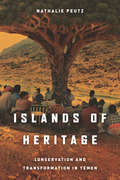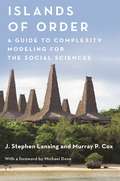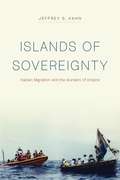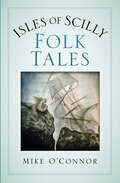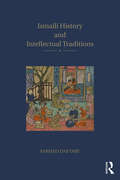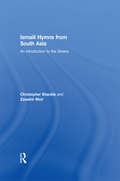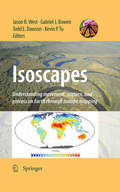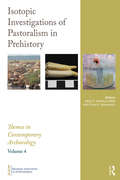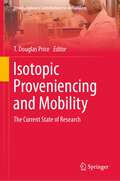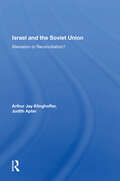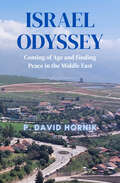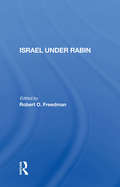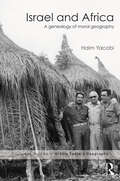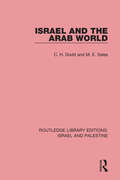- Table View
- List View
Islands of Heritage: Conservation and Transformation in Yemen
by Nathalie PeutzSoqotra, the largest island of Yemen's Soqotra Archipelago, is one of the most uniquely diverse places in the world. A UNESCO natural World Heritage Site, the island is home not only to birds, reptiles, and plants found nowhere else on earth, but also to a rich cultural history and the endangered Soqotri language. Within the span of a decade, this Indian Ocean archipelago went from being among the most marginalized regions of Yemen to promoted for its outstanding global value. Islands of Heritage shares Soqotrans' stories to offer the first exploration of environmental conservation, heritage production, and development in an Arab state. Examining the multiple notions of heritage in play for twenty-first-century Soqotra, Nathalie Peutz narrates how everyday Soqotrans came to assemble, defend, and mobilize their cultural and linguistic heritage. These efforts, which diverged from outsiders' focus on the island's natural heritage, ultimately added to Soqotrans' calls for political and cultural change during the Yemeni Revolution. Islands of Heritage shows that far from being merely a conservative endeavor, the protection of heritage can have profoundly transformative, even revolutionary effects. Grassroots claims to heritage can be a potent form of political engagement with the most imminent concerns of the present: human rights, globalization, democracy, and sustainability.
Islands of History: Structure In The Early History Of The Sandwich Islands Kingdom (Asao Special Publications; Ser.)
by Marshall SahlinsMarshall Sahlins centers these essays on islands—Hawaii, Fiji, New Zealand—whose histories have intersected with European history. But he is also concerned with the insular thinking in Western scholarship that creates false dichotomies between past and present, between structure and event, between the individual and society. Sahlins's provocative reflections form a powerful critique of Western history and anthropology.
Islands of Order: A Guide to Complexity Modeling for the Social Sciences (Princeton Studies in Complexity #33)
by J. Stephen Lansing Murray P. CoxOver the past two decades, anthropologist J. Stephen Lansing and geneticist Murray Cox have explored dozens of villages on the islands of the Malay Archipelago, combining ethnographic research with research into genetic and linguistic markers to shed light on how these societies change over time. Islands of Order draws on their pioneering fieldwork to show how the science of complexity can be used to better understand unstable dynamics in culture, language, cooperation, and the emergence of hierarchies.Complexity science has opened exciting new vistas in physics and biology, but poses challenges for social scientists. What triggers fundamental, discontinuous social change? And what brings stable patterns—islands of order—into existence? Lansing and Cox begin with an incisive and accessible introduction to models of change, from simple random drift to coupled interactions, phase transitions, co-phylogenies, and adaptive landscapes. Then they take readers on a series of journeys to the islands of the Indo-Pacific to demonstrate how social scientists can harness these powerful tools to discover out-of-equilibrium social dynamics. Lansing and Cox address empirical questions surrounding the colonization of the Pacific, the relationship of language to culture, the emergence and disappearance of male and female hierarchies, and more.Unlocking new possibilities for the social sciences, Islands of Order is accompanied by an interactive companion website that enables readers to explore the models described in the book.
Islands of Sovereignty: Haitian Migration and the Borders of Empire (Chicago Series in Law and Society)
by Jeffrey S. KahnIn Islands of Sovereignty, anthropologist and legal scholar Jeffrey S. Kahn offers a new interpretation of the transformation of US borders during the late twentieth century and its implications for our understanding of the nation-state as a legal and political form. Kahn takes us on a voyage into the immigration tribunals of South Florida, the Coast Guard vessels patrolling the northern Caribbean, and the camps of Guantánamo Bay—once the world’s largest US-operated migrant detention facility—to explore how litigation concerning the fate of Haitian asylum seekers gave birth to a novel paradigm of offshore oceanic migration policing. Combining ethnography—in Haiti, at Guantánamo, and alongside US migration patrols in the Caribbean—with in-depth archival research, Kahn expounds a nuanced theory of liberal empire’s dynamic tensions and its racialized geographies of securitization. An innovative historical anthropology of the modern legal imagination, Islands of Sovereignty forces us to reconsider the significance of the rise of the current US immigration border and its relation to broader shifts in the legal infrastructure of contemporary nation-states across the globe.
Isle of Rum: Havana Club, Cultural Mediation, and the Fight for Cuban Authenticity
by Christopher ChávezFocusing on Havana Club rum as a case study, Isle of Rum examines the ways in which Western cultural producers, working in collaboration with the Cuban state, have assumed responsibility for representing Cuba to the outside world. Christopher Chávez focuses specifically on the role of advertising practitioners, musicians, filmmakers, and visual artists, who stand to benefit economically by selling an image of Cuba to consumers who desperately crave authentic experiences that exist outside of the purview of the marketplace. Rather than laying claim to authentic Cuban culture, Chávez explores which aspects of Cuban culture are deemed most compelling and, therefore, most profitable by corporate marketers. As a joint venture between the Cuban state and Pernod Ricard, a global spirits marketer based in Paris, Havana Club embodies the larger process of economic reform, which was meant to reintegrate Cuba into global markets during Cuba’s Special Period in a Time of Peace.
Isles of Scilly Folk Tales
by Mike O'ConnorScilly has been its own unique land for centuries, separate from England and cut off from Cornwall by twenty-five miles of rough sea – yet until now its folk tales have been poorly documented. Let Anthony the droll-teller and his companions guide you on this voyage around the wonderful Isles of Scilly: a place of smugglers and shipwrecks, pirates and privateers, legends and long lost tales.
Islāmic Counselling and Psychotherapy: An Introduction to Theory and Practice
by G. Hussein RassoolIslāmic Counselling and Psychotherapy: An Introduction to Theory and Practice provides foundation-level knowledge of and perspective on the fundamental principles and practices of counselling and psychotherapy from an Islāmic perspective.This groundbreaking practical framework incorporates Islāmic spirituality, religion, and cultural contexts into the therapeutic process. It makes the case that authentic Islāmic spirituality, based on submission to God, forms the cornerstone of good mental health. The book’s foundation focuses on the therapist’s role and ethical considerations specific to Islāmic psychotherapy. It explores the integration of Qur’ânic teachings and hādīths and delves into dream interpretation and the clinical applications of the Siraat Al-Islāmic psychotherapy practice model. This thoroughly revised new edition also highlights advances and developments in scholarship and evidence-based practices and introduces postmodern psychotherapy approaches like narrative and hope therapy. This text provides a clear understanding of the nature, scope, and process of Islāmic psychotherapy for Islāmic practitioners or clinicians working with Muslim clients.
Ismaili History and Intellectual Traditions
by Farhad DaftaryThe Ismailis represent an important Shiʿi Muslim community with rich intellectual and literary traditions. The complex history of the Ismailis dates back to the second/eighth century when they separated from other Shiʿi groups under the leadership of their own imams. Soon afterwards, the Ismailis organised a dynamic, revolutionary movement, known as the daʿwa or mission, for uprooting the Sunni regime of the Abbasids and establishing a new Shiʿi caliphate headed by the Ismaili imam. By the end of the third/ninth century, the Ismaili dāʿīs, operating secretly on behalf of the movement, were active in almost every region of the Muslim world, from Central Asia and Persia to Yemen, Egypt and the Maghrib. This book brings together a collection of the best works from Farhad Daftary, one of the foremost authorities in the field. The studies cover a range of specialised topics related to Ismaili history, historiography, institutions, theology, law and philosophy, amongst other intellectual traditions elaborated by the Ismailis. The collation of these invaluable studies into one book will be of great interest to the Ismaili community as well to anyone studying Islam in general, or Shiʿi Islam in particular.
Ismaili Hymns from South Asia: An Introduction to the Ginans (Soas South Asian Texts Ser. #No. 3)
by Christopher Shackle Zawahir MoirThe Aga Khans have long played a prominent part on the international stage, but much less tends to be understood about the most important group of their followers, the Khoja Ismailis of South Asia, who are now also settled in many other parts of the world. Even less is generally known about the hymns, called ginans, which have historically formed so central an element in the religious life and rituals of the Ismaili community. The principal aim of this anthology is to fill this gap by providing a sympathetic introduction to this still largely unexplored tradition of South Asian devotional literature, and to draw attention to the many features of remarkable interest which it contains.
Isn't That Rich?: Life Among the 1 Percent
by Richard Kirshenbaum Michael GrossCelebrated ad man Richard Kirshenbaum, the original New York observer, reveals the fashions, foibles, and outrageous extravagances of the private-jet set Paid friends. Pot dealers draped in Dolce. Divorce settlements that include the Birkins at their current retail price. Air kisses, landing strips, and lounge-chair bribery. For most of us, the idea of life inside the golden triad of Park Avenue, Sagaponack, and St. Barths is just as exotic as the mysteries of the Bermuda Triangle. Luckily, Richard Kirshenbaum has a VIP pass to the Upper East Side and is willing to share the wealth--of gossip. His New York Observer column on uptown social life provides a fascinating glimpse behind the gilded curtain into the swanky restaurants and eye-popping vacation destinations where the 1 percent gathers.Isn't That Rich? features highlights from Kirshenbaum's monthly column as well as several brand-new essays. From cash-strapped blue bloods willing to trade their good names for a taste of nouveau riche treasure to the fine art of donning a cashmere sweater in Capri, our intrepid correspondent exposes the preoccupations of the posh. His insider sources may be anonymous--Our Lady of the East River wouldn't have it any other way--but the light he shines on their world is dazzling and fabulously fun.
Isn't it Bromantic?: The Bromance Book Club is back ... it's time to find out more about our favourite Russian! (Bromance Book Club #9)
by Lyssa Kay AdamsIf you love Jasmine Guillory, Sally Thorne and Helen Hoang, you'll LOVE Lyssa Kay Adams!'The most inventive, refreshing concept in rom-coms!' Entertainment Weekly The Bromance Book Club was one of Bustle's '21 New Rom-Coms Out In Fall 2019 To Give You Warm And Fuzzy Feelings All Season Long'! 'A you're-gonna-burn-dinner book because you will not want to put it down. Laugh out loud with tons of heart, this is an absolutely adorable must read' Avery Flynn, USA Today bestselling author 'A delightful, fast-paced read with the perfect mix of laugh-out-loud and swoony moments - every town should have a Bromance Book Club' Evie Dunmore, author of Bringing Down the Duke 'It is the reading aloud in this story that ultimately wins my heart, and shows that everything worth knowing can be learned from romance' kc dyer, author of Finding Fraser With his passion for romance novels, it was only a matter of time before Vlad took up the pen to write a novel the Bromance Book Club would swoon over.He's ready to create his own sweeping romance - both on and off the page. Elena Konnikova has lived her entire adult life in the shadows. As the daughter of a Russian journalist who mysteriously disappeared, she escaped danger the only way she knew how. She agreed to marry her childhood friend, Vladimir, and move to the United States, where he is a professional hockey player in Nashville. Vlad, aka The Russian, thought he could be content with his marriage of convenience. But it's become too difficult to continue in a one-sided relationship. He joined the Bromance Book Club to learn how to make his wife love him, but all he's learned is that he deserves more. The Bros are unwilling to let Vlad forgo true love - and this time they're not operating solo, joining forces with Vlad's senior citizen neighbours, a group of meddling widows who call themselves The Loners. But just when things finally look promising, the danger from Elena's past life intrudes. Now the book club face their first-ever life-or-death grand gesture as they race to a happy ever after.Readers are LOVING Isn't It Bromantic!'Five stars for this sweet, sexy, funny read''Wow! What to say about this book? It was everything and more...I loved absolutely everything about this book' 'Sweet and heartfelt and lovely. Vlad is just an absolute love and I could read about him being in love in every book!''This book was the full package. Amazing plot, great characters, sexual chemistry, heart, humour, vulnerability... A masterclass on romance novel construction' 5* reader review'Heartfelt, sweet, emotional and tender... I can't get enough of this group of friends and I can't wait for the next addition!''I adored this book so much and flew through it so fast because I was loving it so much. I found myself laughing out loud multiple times... I just loved being back in this world with these characters so much!''Perfect for the summer holidays. An absolute feel-good romance with plenty of heart, laugh-out-loud scenes, and vulnerable yet strong characters. I couldn't put this book down'Don't miss the rest of the Bromance Book Club series: The Bromance Book Club, Undercover Bromance, and Crazy Stupid Bromance!!
Isoscapes
by Todd E. Dawson Gabriel J. Bowen Jason B. West Kevin P. TuStable isotope ratio variation in natural systems reflects the dynamics of Earth systems processes and imparts isotope labels to Earth materials. Carbon isotope ratios of atmospheric CO2 record exchange of carbon between the biosphere and the atmosphere; the incredible journeys of migrating monarchs is documented by hydrogen isotopes in their wings; and water carries an isotopic record of its source and history as it traverses the atmosphere and land surface. Through these and many other examples, improved understanding of spatio-temporal isotopic variation in Earth systems is leading to innovative new approaches to scientific problem-solving. This volume provides a comprehensive overview of the theory, methods, and applications that are enabling new disciplinary and cross-disciplinary advances through the study of "isoscapes": isotopic landscapes. "This impressive new volume shows scientists deciphering and using the natural isotope landscapes that subtly adorn our spaceship Earth.", Brian Fry, Coastal Ecology Institute, Louisiana State University, USA "An excellent timely must read and must-have reference book for anybody interested or engaged in applying stable isotope signatures to questions in e.g. Anthropology, Biogeochemistry, Ecology, or Forensic Science regarding chronological and spatial movement, changes, or distribution relating to animals, humans, plants, or water.", Wolfram Meier-Augenstein, Centre for Anatomy & Human Identification, University of Dundee, UK "Natural resources are being affected by global change, but exactly where, how, and at what pace? Isoscapes provide new and remarkably precise answers.", John Hayes, Woods Hole Oceanographic Institution, USA "This exciting volume is shaping a new landscape in environmental sciences that is utilizing the remarkable advances in isotope research to enhance and extend the capabilities of the field.", Dan Yakir, Weizmann Institute of Science, Israel
Isotopic Investigations of Pastoralism in Prehistory (Themes in Contemporary Archaeology)
by Alicia R. Ventresca Miller Cheryl A. MakarewiczPastoralists were a vital economic and social force in ancient societies around the globe, transforming landscapes poorly suited for agriculture into spaces of vast productive potential while simultaneously connecting mobile and sedentary communities alike across considerable distances. Drawing from the rich archaeological records of Asia, Africa, and Europe, Isotopic Investigations of Pastoralism in Prehistory brings together the latest studies employing heavy and light stable isotopic analyses of humans and animals to investigate pastoralist diets, movement, and animal management strategies. The contributions presented in this volume highlight new methodological developments while simultaneously drawing attention to the diverse environmental factors that contribute to isotopic variation in human, plant, and animal tissues. Particular attention is paid to how pastoralist decisions regarding animal pasturing and mobility can be teased out of complex isotopic datasets, and also to the challenges in extracting information on the scales of human mobility in pastoralist landscapes. This volume will appeal to scholars in archaeology, anthropology, and ecology, as well as those with interests in animal management.
Isotopic Landscapes in Bioarchaeology
by Gisela Grupe George C. McglynnThis work takes a critical look at the current concept of isotopic landscapes ("isoscapes") in bioarchaeology and its application in future research. It specifically addresses the research potential of cremated finds, a somewhat neglected bioarchaeological substrate, resulting primarily from the inherent osteological challenges and complex mineralogy associated with it. In addition, for the first time data mining methods are applied. The chapters are the outcome of an international workshop sponsored by the German Science Foundation and the Centre of Advanced Studies at the Ludwig-Maximilian-University in Munich. Isotopic landscapes are indispensable tracers for the monitoring of the flow of matter through geo/ecological systems since they comprise existing temporally and spatially defined stable isotopic patterns found in geological and ecological samples. Analyses of stable isotopes of the elements nitrogen, carbon, oxygen, strontium, and lead are routinely utilized in bioarchaeology to reconstruct biodiversity, palaeodiet, palaeoecology, palaeoclimate, migration and trade. The interpretive power of stable isotopic ratios depends not only on firm, testable hypotheses, but most importantly on the cooperative networking of scientists from both natural and social sciences. Application of multi-isotopic tracers generates isotopic patterns with multiple dimensions, which accurately characterize a find, but can only be interpreted by use of modern data mining methods.
Isotopic Proveniencing and Mobility: The Current State of Research (Interdisciplinary Contributions to Archaeology)
by T. Douglas PriceThis volume provides a state-of-the-art presentation and discussion of procedures, especially what works and what doesn’t — on isotopic proveniencing, learned over the last 30 years. The volume focuses on application, not method, to emphasize to the reader the wide range of questions that can be addressed using isotopic proveniencing. Topics covered include samples, baselines, isoscapes, and place of origin. Isotopic proveniencing has become almost standard procedure in the analysis of archaeological burials as a means of distinguishing locals from foreigners. The combination of isotopic proveniencing and DNA has moved archaeological interest in migration and mobility to the fore, but there is very little synthetic work published for either technology.The field has evolved and new procedures and guidelines have emerged that have not been widely heard and this volume seeks to rectify this. The contributors have been selected from among the leaders in the field, those with active research and hands-on experience with the technology. This volume is of relevance to archaeologists.
Israel (The Contemporary Middle East)
by Ilan PappéIsrael is not the only ‘new’ state around, but it is one of the few states whose legitimacy is still questioned, and its future affects the future of the Middle East as a whole and probably the stability of the international system. The reasons for this unique reality lie in its past and the particular historical circumstances of its birth. This book seeks to update analysis of the political history, contemporary politics, economics and foreign policy of this unique state. The first part of the book provides a general history of Israel since its inception until 2000. This general history evolves around the political development of the state, beginning with its origins in the early Zionist history (1882–1948) and ending with the turn of the century. The second part focuses on three contemporary aspects of present-day Israel: its political economy, its culture and its international relations. An epilogue describes Israel’s complex international image today and its impact on the state and its future. Providing a solid infrastructure from which readers can form their own opinions, this book offers a fresh perspective on developments both on the ground and in recent scholarship, and is essential reading for students, journalists and policy makers with an interest in Middle Eastern History, Jewish Studies and Israel Studies.
Israel - Culture Smart!
by Jeffrey Geri Marian LeborA world leader in hi-tech, Israel has been dubbed "the start-up nation"--a description that could equally well apply to its remarkable birth as a haven for Jewish immigrants and refugees. Having started with few natural resources just over sixty years ago, it is now a thriving democracy and a regional superpower. This dynamic, diverse, and paradoxical country is steeped in history and biblical associations, yet most Israelis are modern, secular, and energetically materialistic. The hostility of its neighbors has helped to forge Israeli identity and has been a spur to growth and innovation. This success has had a price. Since 1948 every generation of Israelis has been touched by war. For this reason, perhaps, Israelis tend to live intensely. They have a huge passion for life, are great strivers after excellence, are always open to new ideas, and are risk-takers. The tensions within Israeli society of tradition and modernity, ethnic diversity, religious and secular worldviews, and civic and martial values are the ingredients of a unique human experiment. Israel is a cauldron of creativity and contradictions. This revised edition of Culture Smart! Israel describes increasing polarization. The gap between rich and poor is widening, and an unprecedented social protest movement--the so-called "cottage cheese revolution"--has taken the establishment by surprise. Elections have removed the ultra-Orthodox parties from power but produced a coalition divided over the questions of peace and settlements. Demographic growth is greatest in the Orthodox Jewish and Israeli Arab communities. Attitudes and behavior are being challenged and reassessed across the land. For the visitor, all this is a source of fascination. Culture Smart! Israel will help you to discover the human reality beyond the clichés of the tourist brochures. Israelis are generous and outgoing hosts. By deepening your understanding of them, you will be able to make genuine friends and valued business partners.
Israel And Syria: Peace And Security On The Golan
by Aryeh ShalevThis book demonstrates that the strategic importance of the Golan Heights lies in three spheres: defense, deterrence, and bargaining asset. It examines security arrangements that are a crucial element for Israel's security and for the prevention of war with Syria during the transition period.
Israel And The Soviet Union: Alienation Or Reconciliation
by Arthur J KlinghofferThis volume is a survey of Soviet-Israeli relations from the time when the U.S.S.R. supported the establishment of Israel's independence in 1947-48. Although diplomatic relations have been broken since 1967, the author shows how many contacts there have been, from conversations at the foreign minister level to the visits of individuals and delegations.
Israel Denial: Anti-Zionism, Anti-Semitism, & The Faculty Campaign Against the Jewish State
by Cary NelsonA work of “rigorous intellectual inquiry” critiquing the BDS movement in academia (Jewish Journal). Israel Denial is the first book to offer detailed analyses of the work faculty members have published—individually and collectively—in support of the Boycott, Divestment, and Sanctions (BDS) movement; it contrasts their claims with options for promoting peace. The faculty discussed here have devoted a significant part of their professional lives to delegitimizing the Jewish state. While there are beliefs they hold in common—including the conviction that there is nothing good to say about Israel—they also develop distinctive arguments designed to recruit converts to their cause in novel ways. They do so both as writers and as teachers; Israel Denial is the first to give substantial attention to anti-Zionist pedagogy. No effort to understand the BDS movement’s impact on the academy and public policy can be complete without the kind of understanding this book offers.A co-publication of the Academic Engagement Network
Israel Odyssey: Coming of Age and Finding Peace in the Middle East
by P. David HornikA deeply personal account of an American Jew&’s relocation to the Holy Land from &“one of Israel&’s best-informed and most astute journalists&” (Chicago Jewish Star). What makes a young American Jew who was never encouraged to move to Israel—whether by individuals or in an organizational framework—suddenly decide to do so at age twenty-eight? How does a young American Jewish family, with little background in Hebrew, make its way in a new, highly distinct culture with no more than a shallow resemblance to America&’s? This memoir traces the unlikely emergence in its author of a fascination, a passionate concern, and an identification with Israel that left him no choice but to relocate there. On the one hand, his parents were Austrian Jewish refugees from Nazism; on the other, the family moved to what was then a rural area of New York State where almost no other Jews lived—resulting in a richly complex, albeit confusing and difficult, identity to navigate. Israel Odyssey opens a window on modern Israel as seen by an immigrant both deeply patriotic but, at the same time, carrying cultural baggage from across the ocean. P. David Hornik&’s highly personal story is his quest for inner peace and fulfillment amid the pressures, strife, and special vitality of the old-new Land.
Israel Under Netanyahu: Domestic Politics and Foreign Policy
by Robert O. FreedmanExamining Benjamin Netanyahu’s more than a decade-long period as Israel’s Prime Minister, this important book evaluates the domestic politics and foreign policy of Israel from 2009-2019. This comprehensive study assesses Israel’s main political parties, highlights the special position in Israel of Israel’s Arab, Russian and religious communities, appraises Netanyahu’s stewardship of Israel’s economy, and analyzes Israel’s foreign relations. The scholars contributing to the volume are leading experts from both Israel and the United States and represent a broad spectrum of viewpoints on Israeli politics and foreign policy. The case studies cover the Likud party, the non-religious opposition parties such as Labor, Meretz, and Yesh Atid, the Arab parties, the religious parties and the Russian-based Yisrael B’Aliyah party, and present analyses of the ups and downs of Israel’s relations with the United States, the American Jewish Community, Iran, Europe, the Palestinians, the Arab World, Russia, China, India, and Turkey as well as Israel’s challenges in dealing with terrorism. Another highlight of the book is an assessment of Netanyahu’s leadership of the Likud party, which seeks to answer the question as to whether Netanyahu is a pragmatist interested in a peace deal with the Palestinians or an ideologue who wants Israel to hold on to the West Bank as well as all of Jerusalem. This volume will be of interest to readers who wish to understand the dynamics of Israel during Benjamin Netanyahu’s time as Prime Minister and are interested in the history and politics of Israel and the Middle East.
Israel Under Rabin
by Robert O FreedmanThe 1992 elections represented a watershed in Israeli politics. Returning to power for the first time in fifteen years, the Labor government, under Yitzhak Rabin, has implemented significant changes in foreign policy and domestic politics. Perhaps the most important changes were Israel's recognition of the PLO and the signing of the Declaration of
Israel and Africa: A Genealogy of Moral Geography (Routledge Studies in Middle Eastern Geography)
by Haim YacobiIsrael and Africa critically examines the ways in which Africa – as a geopolitical entity - is socially manufactured, collectively imagined but also culturally denied in Israeli politics. Its unique exploration of moral geography and its comprehensive, interdisciplinary research on the two countries offers new perspectives on Israeli history and society. Through a genealogical investigation of the relationships between Israel and Africa, this book sheds light on the processes of nationalism, development and modernization, exploring Africa’s role as an instrument in the constant re-shaping of Zionism. Through looking at "Israel in Africa" as well as "Africa in Israel", it provides insightful analysis on the demarcation of Israel's ethnic boundaries and identity formation as well as proposing the different practices, from architectural influences to the arms trade, that have formed the geopolitical concept of "Africa". It is through these practices that Israel reproduces its internal racial and ethnic boundaries and spaces, contributing to its geographical imagination as detached not solely from the Middle East but also from its African connections. This book would be of interest to students and scholars of Middle East and Jewish Studies, as well as Post-colonial Studies, Geography and Architectural History.
Israel and the Arab World (Routledge Library Editions: Israel and Palestine)
by C.H. Dodd M.E. SalesThe Arab-Israeli conflict provides the world with one of its most intractable and dangerous problems. This documentary analysis of the period, first published in 1970, from the First World War to 1968 will be welcomed by all those who seek an impartial understanding of the problem. The editors have gathered together documents ranging from official papers, original maps and a Palestine/Israel population graph to quotations from contemporary historians and observers. So far as possible the documents themselves are made to tell the dramatic story of Arab-Israel relations. But the editors also place them in the broader context of Middle Eastern history and indicate major points of interest. The conclusion analyses fundamental issues and an appendix contains questions which may be answered from a study of the documents, thus providing a useful basis for discussion.
